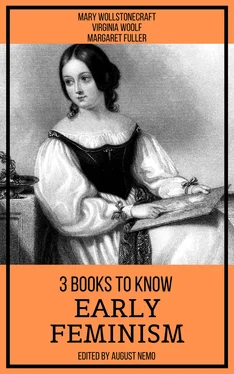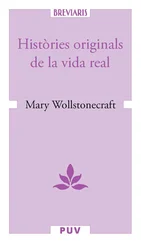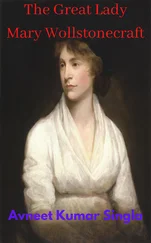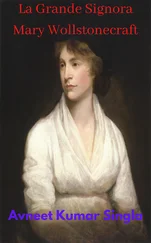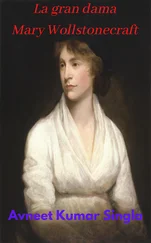Madame Genlis has written several entertaining books for children; and her Letters on Education afford many useful hints, that sensible parents will certainly avail themselves of; but her views are narrow, and her prejudices as unreasonable as strong.
I shall pass over her vehement argument in favour of the eternity of future punishments, because I blush to think that a human being should ever argue vehemently in such a cause, and only make a few remarks on her absurd manner of making the parental authority supplant reason. For every where does she inculcate not only blind submission to parents; but to the opinion of the world. [39]
She tells a story of a young man engaged by his father’s express desire to a girl of fortune. Before the marriage could take place, she is deprived of her fortune, and thrown friendless on the world. The father practises the most infamous arts to separate his son from her, and when the son detects his villany, and following the dictates of honour marries the girl, nothing but misery ensues, because forsooth he married without his father’s consent. On what ground can religion or morality rest when justice is thus set as defiance? With the same view she represents an accomplished young woman, as ready to marry any body that her mama pleased to recommend; and, as actually marrying the young man of her own choice, without feeling any emotions of passion, because that a well educated girl had not time to be in love. Is it possible to have much respect for a system of education that thus insults reason and nature?
Many similar opinions occur in her writings, mixed with sentiments that do honour to her head and heart. Yet so much superstition is mixed with her religion, and so much worldly wisdom with her morality, that I should not let a young person read her works, unless I could afterwards converse on the subjects, and point out the contradictions.
Mrs. Chapone’s Letters are written with such good sense, and unaffected humility, and contain so many useful observations, that I only mention them to pay the worthy writer this tribute of respect. I cannot, it is true, always coincide in opinion with her; but I always respect her.
The very word respect brings Mrs. Macaulay to my remembrance. The woman of the greatest abilities, undoubtedly, that this country has ever produced. — And yet this woman has been suffered to die without sufficient respect being paid to her memory.
Posterity, however, will be more just; and remember that Catharine Macaulay was an example of intellectual acquirements supposed to be incompatible with the weakness of her sex. In her style of writing, indeed, no sex appears, for it is like the sense it conveys, strong and clear.
I will not call hers a masculine understanding, because I admit not of such an arrogant assumption of reason; but I contend that it was a sound one, and that her judgment, the matured fruit of profound thinking, was a proof that a woman can acquire judgment, in the full extent of the word. Possessing more penetration than sagacity, more understanding than fancy, she writes with sober energy and argumentative closeness; yet sympathy and benevolence give an interest to her sentiments, and that vital heat to arguments, which forces the reader to weigh them. [40]
When I first thought of writing these strictures I anticipated Mrs. Macaulay’s approbation, with a little of that sanguine ardour, which it has been the business of my life to depress; but soon heard with the sickly qualm of disappointed hope; and the still seriousness of regret — that she was no more!
§ V.
Taking a view of the different works which have been written on education, Lord Chesterfield’s Letters must not be silently passed over. Not that I mean to analyze his unmanly, immoral system, or even to cull any of the useful, shrewd remarks which occur in his epistles — No, I only mean to make a few reflections on the avowed tendency of them — the art of acquiring an early knowledge of the world. An art, I will venture to assert, that preys secretly, like the worm in the bud, on the expanding powers, and turns to poison the generous juices which should mount with vigour in the youthful frame, inspiring warm affections and great resolves. [41]
For every thing, saith the wise man, there is a season; — and who would look for the fruits of autumn during the genial months of spring? But this is mere declamation, and I mean to reason with those worldly-wise instructors, who, instead of cultivating the judgment, instill prejudices, and render hard the heart that gradual experience would only have cooled. An early acquaintance with human infirmities; or, what is termed knowledge of the world, is the surest way, in my opinion, to contract the heart and damp the natural youthful ardour which produces not only great talents, but great virtues. For the vain attempt to bring forth the fruit of experience, before the sapling has thrown out its leaves, only exhausts its strength, and prevents its assuming a natural form; just as the form and strength of subsiding metals are injured when the attraction of cohesion is disturbed.
Tell me, ye who have studied the human mind, is it not a strange way to fix principles by showing young people that they are seldom stable? And how can they be fortified by habits when they are proved to be fallacious by example? Why is the ardour of youth thus to be damped, and the luxuriancy of fancy cut to the quick? This dry caution may, it is true, guard a character from worldly mischances; but will infallibly preclude excellence in either virtue or knowledge. [42]The stumbling-block thrown across every path by suspicion, will prevent any vigorous exertions of genius or benevolence, and life will be stripped of its most alluring charm long before its calm evening, when man should retire to contemplation for comfort and support.
A young man who has been bred up with domestic friends, and led to store his mind with as much speculative knowledge as can be acquired by reading and the natural reflections which youthful ebullitions of animal spirits and instinctive feelings inspire, will enter the world with warm and erroneous expectations. But this appears to be the course of nature; and in morals, as well as in works of taste, we should be observant of her sacred indications, and not presume to lead when we ought obsequiously to follow.
In the world few people act from principle; present feelings, and early habits, are the grand springs: but how would the former be deadened, and the latter rendered iron corroding fetters, if the world were shewn to young people just as it is; when no knowledge of mankind or their own hearts, slowly obtained by experience, rendered them forbearing? Their fellow creatures would not then be viewed as frail beings; like themselves, condemned to struggle with human infirmities, and sometimes displaying the light, and sometimes the dark side of their character; extorting alternate feelings of love and disgust; but guarded against as beasts of prey, till every enlarged social feeling, in a word — humanity, was eradicated.
In life, on the contrary, as we gradually discover the imperfections of our nature, we discover virtues, and various circumstances attach us to our fellow creatures, when we mix with them, and view the same objects, that are never thought of in acquiring a hasty unnatural knowledge of the world. We see a folly swell into a vice, by almost imperceptible degrees, and pity while we blame; but, if the hideous monster burst suddenly on our sight, fear and disgust rendering us more severe than man ought to be, might lead us with blind zeal to usurp the character of omnipotence, and denounce damnation on our fellow mortals, forgetting that we cannot read the heart, and that we have seeds of the same vices lurking in our own.
I have already remarked that we expect more from instruction, than mere instruction can produce: for, instead of preparing young people to encounter the evils of life with dignity and to acquire wisdom and virtue by the exercise of their own faculties, precepts are heaped upon precepts, and blind obedience required, when conviction should be brought home to reason.
Читать дальше
